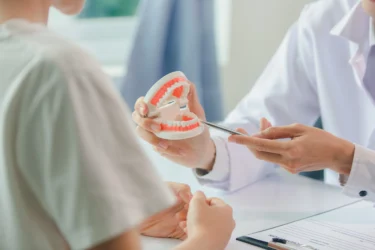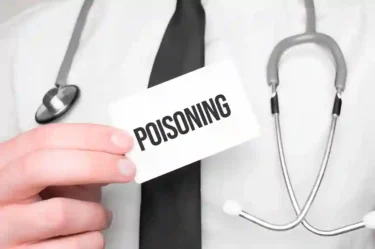Why Do I Have a Metallic Taste in My Mouth? Unearthing Possible Causes
By Dr. Nayana Shetty +2 more

Get,

to manage your symptom
Get your,


4 Cr+ families
benefitted

OTP sent to 9988776655



You’ve successfully subscribed to receive
doctor-approved tips on
Whatsapp

Get ready to feel your best.

Hi There,
Download the PharmEasy App now!!


Register to Avail the Offer
Send OTPBy continuing, you agree with our Privacy Policy and Terms and Conditions

Hi There,
Sign up on PharmEasy now!!
Trusted by 4 crore+ families

OTP sent to 9988776655



You have unlocked 25% off on medicines




Code: NU25
By Dr. Nayana Shetty +2 more
Table of Contents
Do you ever have days when your mouth tastes rusty? This strange taste is linked to dysgeusia, a term used to describe altered taste. Metallic taste can be rather worrying, especially if it hangs around. But there’s no need to panic. The metallic taste is usually not a big deal. It’s often due to common factors we’ll explore here.
We’ll look at the reasons why you may have a metallic taste in your mouth and what does metallic taste in mouth means. We’ll also look at common causes of metallic taste in the mouth, its diagnosis procedures, and talk about when you should see a doctor. Alongside this, we’ll share ways in which you may handle this weird taste. Lastly, we’ll answer some common queries regarding a metallic taste in the mouth.

Did you know?
The aim is clear. To investigate what causes a metallic taste in the mouth? Let’s find out the usual suspects behind metallic taste in the mouth11.

Your mouth care routine could be hiding the reason for your metallic taste. Many oral health issues can cause this.

Certain health issues can tamper with your sense of taste. This can result in a metallic flavor in your mouth.

If you’re thinking, why do I have a metallic taste in my mouth while pregnant? Well, hormonal changes might be messing with your taste and smell. It often results in a metallic taste, more so during early pregnancy7.
Dysgeusia, also known as an altered taste in the mouth, often complained of as a metallic taste, happens during the first trimester of pregnancy and goes away by the second trimester as the hormonal levels settle down, rarely extending till child birth.
Dr. Ashish Bajaj, M.B.B.S., M.D. in Clinical Pharmacology and Toxicology

Certain meds and supplements may leave a metallic taste in your mouth1. These include:

Cancer treatments like chemo or radiation may alter taste. This may bring about a metallic taste in your mouth2.

Coming in touch with toxins like mercury or lead can irritate your taste buds. This could give you a metallic taste.

Food allergies can bring a metallic taste to your mouth. More severe reactions may show anaphylaxis symptoms. This calls for urgent medical help8.
A metallic taste can indicate a serious illness, such as kidney or liver problems, undiagnosed diabetes or certain cancers. But these reasons are uncommon and typically accompanied by other symptoms. If you’re otherwise healthy, the cause for that metallic tang typically is benign.
Dr. M.G. Kartheeka, MBBS, MD(Pediatrics)
The metallic taste may come and go for some. It might be harmless. But it’s wise to know when it’s time to see a healthcare professional.
Once the cause of the metallic taste is clear, you can work out a game plan with your healthcare provider on how to get rid of metallic taste in mouth. The aim is to tackle the issue and avoid a relapse.
Getting to the root of the metallic taste is crucial. So is making yourself comfortable as you navigate it.
Also Read: Best Home Remedies for Wisdom Tooth Pain
The metallic taste in your mouth can be a bother. But don’t worry, it could be managed and potentially resolved. Knowing the cause is half the battle. Seeking medical ideas for diagnosing and treating it is crucial. A healthy lifestyle goes a long way too. If the metallic taste comes from an underlying health issue or medication, work with your healthcare provider. Find the best course of action and take charge of wellness.
Always listen to your body. Keep your eyes open for changes. Don’t shy away from discussing them with your doctor. The metallic taste may just be a passing phase. It could also hint at a larger issue needing a doctor’s attention. To ensure great health, stay aware, and stay proactive.
Yes, some COVID-19 patients have reported a metallic taste. This is only one among many symptoms. The exact cause for this taste change isn’t completely clear.
No exact deficiency causes a metallic taste. But end-stage liver failure might cause it. Wherein you may see low levels of B vitamins, vitamin C, zinc, and copper.
Usually, a metallic taste isn’t serious, but it can be. If it’s persistent, it’s best to check with a healthcare provider.
Start with looking after your oral hygiene. Stay hydrated. Eat non-metallic-tasting foods. Use flavor enhancers and mouth rinses. If needed, your healthcare provider can help you tackle any underlying health issues or medication-related side effects1.
The duration of the metallic taste depends on the cause. Short-term causes like a common cold will clear up when the infection does. If it’s medicine-related or due to a health issue, it takes longer.
See a healthcare provider if the metallic taste doesn’t leave. It’s particularly important if it’s coupled with bad symptoms.
Yes, adopting certain lifestyle changes such as maintaining good oral hygiene, staying hydrated, focusing on a well-balanced diet, and avoiding triggers like smoking and alcohol may help alleviate a metallic taste in the mouth.
A metallic taste can be an early symptom of anaphylaxis, a severe allergic reaction associated with certain foods or substances. However, it may also be a natural response to specific food allergens like shellfish or tree nuts8.
Some foods, like pine nuts, may cause a temporary metallic taste in the mouth – a condition known as “pine nut syndrome” or “pine mouth.” Additionally, the consumption of vitamins and supplements containing metals, such as zinc, copper, or iron, may also create a metallic taste.
A metallic taste upon waking can stem from various factors such as dehydration, oral health issues like gingivitis, or even acid reflux during sleep. Ensuring proper hydration and maintaining good oral hygiene can help alleviate this sensation. If it persists, consulting a healthcare provider is recommended.
The duration of a metallic taste during pregnancy varies among individuals. Typically, it may last throughout the first trimester due to hormonal changes, but it can subside sooner or persist longer for some women. If concerns arise, consulting a healthcare provider is advisable7.
Experiencing a metallic taste in the mouth can be a symptom of pregnancy7, particularly in the early stages due to hormonal changes. However, it’s not definitive proof of pregnancy and can also be caused by other factors such as certain medications1 or oral health issues. A pregnancy test or consultation with a healthcare provider can provide clarity.
A metallic taste in the mouth can sometimes indicate low iron levels, known as iron deficiency anemia. However, it’s essential to consider other potential causes as well, such as medication side effects1 or oral health issues. Consulting a healthcare professional for proper evaluation and testing is recommended.
A metal taste in mouth can indicate infection, particularly in cases like sinusitis or respiratory infections where postnasal drip can affect taste sensations. However, it’s essential to consider other symptoms and consult a healthcare professional for proper diagnosis and treatment.
While influenza (flu) itself typically doesn’t directly cause a metallic taste in the mouth, certain medications used to manage flu symptoms or complications may lead to this sensation as a side effect. If experiencing a metallic taste during flu, consulting a healthcare provider for evaluation and appropriate management is advisable.
Yes, antibiotics can sometimes lead to a metallic taste in the mouth as a side effect. This sensation typically resolves once the course of antibiotics is completed, but if it persists or becomes bothersome, consulting a healthcare provider is advisable.
Allergies can potentially cause a metallic taste in the mouth due to postnasal drip or sinus congestion affecting taste sensations. However, it’s essential to consider other factors and consult a healthcare professional for proper evaluation and management of allergies and related symptoms8.
Yes, vaping can cause a metallic taste in the mouth, often due to the ingredients in e-liquids or the heating coils used in vaping devices. This sensation may indicate irritation or inflammation in the mouth and respiratory tract, and reducing or quitting vaping is advisable if experiencing this symptom.
Yes, stress can lead to a metallic taste in the mouth as a result of changes in saliva composition and increased acidity levels. This sensation is often temporary and can be managed by practicing stress-reduction techniques such as mindfulness or deep breathing exercises.
Yes, a metallic taste can come and go during pregnancy7. This phenomenon, known as dysgeusia, is often experienced in the first trimester and can be influenced by hormonal changes, typically improving as pregnancy progresses.
The duration of a metallic taste after chemotherapy varies for each individual. It can last from a few days to several months after treatment ends, with some patients experiencing it intermittently during their entire chemotherapy course.
Yes, dry mouth can cause a metallic taste. Reduced saliva production affects taste perception and can lead to the development of unusual tastes, including a metallic flavor.
Yes, detoxing can cause a metallic taste. This occurs as the body releases and processes toxins, which can temporarily alter taste perception and result in a metallic flavor.
The metallic taste from metformin often diminishes over time as the body adjusts to the medication. If the taste persists, discussing it with a healthcare provider may help find a solution or alternative treatment.
A metallic taste can start as early as the first trimester of pregnancy7. This change in taste perception is often due to hormonal fluctuations, particularly increased levels of estrogen and progesterone.
Disclaimer: The information provided here is for educational/awareness purposes only and is not intended to be a substitute for medical treatment by a healthcare professional and should not be relied upon to diagnose or treat any medical condition. The reader should consult a registered medical practitioner to determine the appropriateness of the information and before consuming any medication. PharmEasy does not provide any guarantee or warranty (express or implied) regarding the accuracy, adequacy, completeness, legality, reliability or usefulness of the information; and disclaims any liability arising thereof.
Links and product recommendations in the information provided here are advertisements of third-party products available on the website. PharmEasy does not make any representation on the accuracy or suitability of such products/services. Advertisements do not influence the editorial decisions or content. The information in this blog is subject to change without notice. The authors and administrators reserve the right to modify, add, or remove content without notification. It is your responsibility to review this disclaimer regularly for any changes.
Comments

Leave your comment...
You may also like
Comments